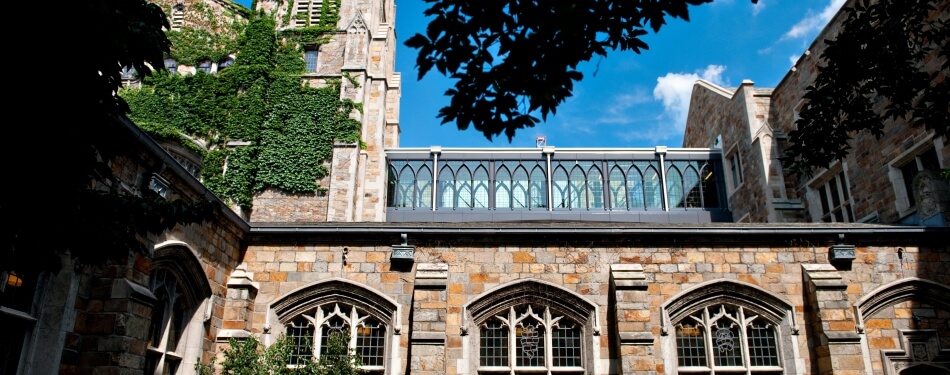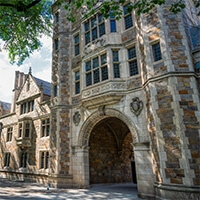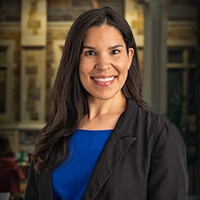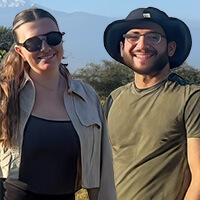Michigan Innocence Clinic (MIC) client Kevin Harrington became MIC’s 23rd exoneree on April 21 after the order vacating his conviction was signed and filed in the Wayne County Circuit Court. The victory comes after 11 years of work on the case from 27 MIC student-attorneys. Also exonerated was Harrington’s one-time co-defendant George Clark, who was represented pro bono by attorneys in the Columbus office of Jones Day. The two men each served more than 17 years incarcerated for crimes they did not commit.
“This victory also comes in great part thanks to the excellent Conviction Integrity Unit of the Wayne County Prosecutor’s office,” said Imran Syed, ‘11, MIC’s assistant director, who first started working on this case as a second-year law student in 2009. “Our students did excellent work over many years—I was fortunate enough to supervise all of it—but there is no doubt that Mr. Clark and Mr. Harrington would still be in prison, if not for the Conviction Integrity Unit.”
Harrington was convicted of first-degree murder after four jury trials in Wayne County. His case stems from a 2002 murder in Inkster, Michigan. He was convicted at the first trial in 2003 along with co-defendant George Clark. Clark’s conviction was upheld on appeal, but Harrington was granted a new trial shortly after his first conviction. Two subsequent trials ended in hung juries, until Harrington was finally convicted in his fourth trial in 2007.
MIC began investigating the case in 2009, which Syed said was “a case of fairly extreme police misconduct, even more noteworthy because much of the misconduct was documented and known to the juries at the trials.” The crime was the shooting death of a man outside his home. The only witness was a woman who stated many times that she did not see or hear anything, but called 911 when she was told there was a dead body near her house. Police arrested her and compelled her into implicating Clark and Harrington by stating that her kids would be taken away if she failed to cooperate.
Early in the investigation, MIC student-attorneys discovered that Harrington had an excellent alibi (he was in New Mexico), but they worried that the evidence for the alibi would not be enough to overturn the conviction. They then found a man who said his deceased brother had been the true shooter, and other people corroborated that claim. As MIC attorneys searched for additional new evidence, they also started jointly investigating Clark’s case, before referring his case to the Columbus office of Jones Day, which agreed to represent him on a pro bono basis. MIC’s relationship with Jones Day goes back several years to when it made another pro bono referral to Jones Day in the case of Hattie Tanner, a Battle Creek, Michigan, woman who had been wrongfully convicted of murder and was exonerated through Jones Day’s efforts in 2017.
As MIC continued to investigate Harrington’s case, student-attorneys working with private investigator Scott Lewis managed to find a true eyewitness to the crime, and then a second eyewitness who corroborated the first. Both individuals implicated the same person who had been implicated by his own brother years earlier. As MIC worked on preparing a motion for relief from judgment, the Conviction Integrity Unit (CIU) of the Wayne County Prosecutor’s Office became involved and conducted its own independent investigation of the whole case.
The CIU talked to the new eyewitness that MIC student-attorneys had found and determined her to be credible. “Also, because they approached the case with an open mind, they saw the egregious police misconduct in this case for what it was: a concerted effort to coerce a young woman into implicating two innocent men,” Syed said.
As the CIU investigation neared its conclusion, there were COVID-19 outbreaks at each of the prisons where the two defendants were being housed, which heightened the urgency of reaching a resolution. The CIU completed its investigation in mid-April and the Wayne County Prosecutor accepted the CIU’s recommendation of vacating the conviction and dismissing charges. Clark was released after being granted bond last week, and Harrington was released April 21 after the order vacating the conviction was signed and filed.
The Michigan Innocence Clinic, established in 2009, works to free those who have been wrongly convicted and focuses on cases where there is no DNA to test. To date, 23 individuals have been freed thanks to the clinic’s efforts.







